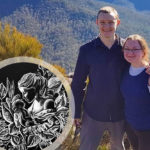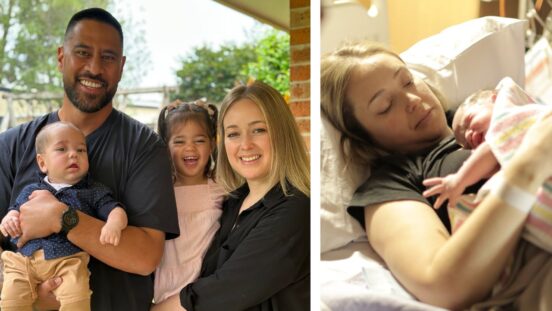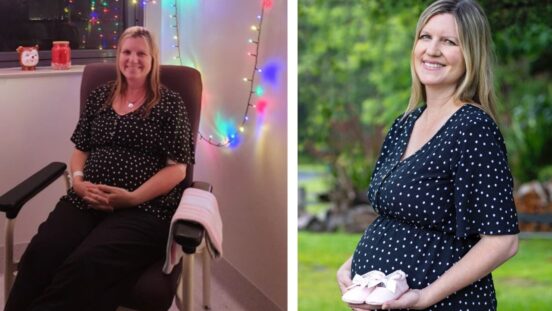Real life: Wollongong mum Gabrielle Micallef shares story of postnatal psychosis.
"I had no confidence in myself to care for this vulnerable little human ...”
Postnatal psychosis is a rare but serious mental illness that affects one to two new mothers in every 1000. It is a potentially life-threatening condition that nearly always requires hospitalisation.
And for Gwyneville mother Gabrielle Micallef, it consumed her first months of parenthood – twice. After the birth of her first boy, Gabrielle knew she wasn’t feeling right, but as a new parent learning the ropes she had no way of knowing what was normal and what was not.

Postnatal psychosis is a rare but serious mental illness that affects one to two new mothers in every 1000.
“I felt my mood plummet. I became teary, felt very overwhelmed and had no confidence in myself to care for this vulnerable little human,” she says.
Gabrielle’s GP prescribed medication and referred her to a psychologist, but she continued to worsen. She remembers shutting down. She became a shell of her former self. She stopped talking and eating. Sometimes her thoughts were racing, at other times she just felt completely numb.
“I could barely function. Engaging in basic care for myself and my baby was impossible. I pushed my poor beloved husband away. The illness made me not want to trust him and my mind had me believing that he was doing ‘bad’ things behind my back and also wanted to harm the baby. I felt like an empty vessel. Unable to love. Unable to live. Everything felt bleak, black and meaningless.”

“I pushed my poor beloved husband away.”
“I was standing in a hurricane of my terrifying thoughts,” says Gabrielle. “My mind was leading me to believe outrageous and scary things. I remember believing that there were cameras in our house and we were under surveillance for plotting to kill my baby. I was completely detached from reality.”
Gabrielle received psychiatric assessment and treatment relatively quickly. But recovery was painfully slow. The scariest psychotic symptoms started to subside with medication, but she continued to suffer ongoing symptoms of depression and anxiety.

“My mind was leading me to believe outrageous and scary things.”
Gabrielle felt exhausted, depressed and lacked confidence in herself and her skills as a mother. With support from friends, family and her church Gabrielle finally made it through the darkness. But it wasn’t her last experience of postnatal psychosis.
After a period filled with renewed hope and optimism, Gabrielle became pregnant again. This time she was sure she’d be prepared – but despite all their preparations and awareness the illness descended again. Gabrielle again experienced delusional thoughts and struggled to function. This time she ended up in a psychiatric ward.

Gabrielle ended up in a psychiatric ward after experiencing postnatal psychosis again after her second pregnancy.
“It was extremely frightening and I felt like a prisoner. I wasn’t with my young baby and that completely tore me apart. I couldn’t believe I’d won the postnatal psychosis lottery twice,” says the mum-of-two.
Gabrielle has recovered now, and looking back, she can take positives out of her experience: “Even though postnatal psychosis comes out of the blue and is scary, painful and traumatic, it is treatable and you can recover. There is hope.”

“I wasn’t with my young baby and that completely tore me apart.”
About Postnatal psychosis
Postnatal psychosis is far more rare than perinatal anxiety and depression, which affects as many as one in five new mums, and one in 10 dads.
Perinatal Anxiety & Depression Australia (PANDA) has witnessed a 51 percent increase in calls to its national helpline over the last 12 months, and is commending parents for seeking support and starting an important conversation.
PANDA CEO Julie Borninkhof said 57 percent of callers in 2020-21 cited stressful life events as one of the reasons for reaching out for help.
“There is no doubt COVID-19 has contributed to the increase in stress felt by expecting and new parents. We have heard from many mums and dads that having less support available has put pressure on families facing isolation, home schooling and separation from loved ones,” Ms Borninkhof said.
“We have also seen more discussion about mental wellness and looking after yourself which has helped mums and dads recognise they may need help – and that’s a good thing.”
Over the last year, PANDA has had more than 40,000 conversations with mums and dads who reached out for help.
“We are so proud to see more callers to the PANDA Helpline and people reaching out for help earlier. They want to make their parenting experience the best it can be, and be there for their bubs at a time when they’re struggling.”

“It is treatable and you can recover. There is hope.”
Sadly, not everyone is able to access help when they need it and PANDA cites five key barriers parents come up against when seeking help – they include language, lack of awareness of perinatal mental health issues, distance from support, a fear of being judged, and access to healthcare professionals.
For this reason, PANDA offers Australia’s only free Perinatal Helpline, community and health professionals Learning Hub and helpful resources translated into 40 languages for families where English is not spoken.
“If people aren’t sure what they are feeling is normal, or if they are seeing signs of mental health distress in loved ones, our website offers 24-hour access to our online mental health checklist,” Ms Borninkhof said.
PANDA recognises having a new baby in your life is not easy, but mums and dads need to know they are not alone. It’s normal to feel overwhelmed, anxious, and depressed at this time.
Anyone having trouble coping with pregnancy or post childbirth can visit www.panda.org.au or call the PANDA Helpline on 1300 726 306 Mon to Fri, 9am – 7.30pm AEST/AEDT.
For information about Perinatal Mental Health Week, head to www.panda.org.au/awareness/perinatal-mental-health-week.




